[ad_1]
POSTED ON: 03/01/22

There is little doubt that the pandemic was a wake-up call for many.
A study in the journal Nature estimated that 103 million Americans, or 31 percent of the U.S. population, had been infected with SARS-CoV-2 by the end of 2020. And sadly, many who succumbed to the virus were those most vulnerable: the elderly, those who already had weakened immune systems, and those generally in poor health overall (obesity, pre-existing health issues).
Suddenly, it wasn’t just about how one would get through contracting the virus, but more how one would avoid getting it altogether. And leading a better, healthier life quickly and expeditiously became a focal point for many.
According to McKinsey & Company in a recent article, their latest research shows “that consumers care deeply about wellness—and that their interest is growing. In a survey of roughly 7,500 consumers in six countries, 79 percent of the respondents said they believe that wellness is important, and 42 percent consider it a top priority. In fact, consumers in every market we researched reported a substantial increase in the prioritization of wellness over the past two to three years.”
McKinsey estimates “the global wellness market at more than $1.5 trillion with an annual growth of 5 to 10 percent.”
And this concern by consumers isn’t just around the typical things you’d associate good health with, like diets, but extensively bleeds out to a whole host of health and wellness topics.
McKinsey identifies these six dimensions of how consumers view wellness:
- Better health
- Better fitness
- Better nutrition
- Better appearance
- Better sleep
- Better mindfulness
I suspect there are more “dimensions,” like mental health. But, in taking all of these into account, a weakness or deficiency in many of these can have a negative and sometimes serious impact on overall mental health, pretty much in any age demographic.
The concept of health and wellness in the minds of the Earth’s populations isn’t new. It’s been around since humans first mastered the use of fire. Mostly, remaining healthy and functional was a means to support tactical approaches like finding food, creating shelter and providing for family. Somewhere along the evolutionary line, addressing those needs became more routine and that focus shifted from simply surviving to living a better, longer and happier life.
Not much has changed in our priorities. But what has changed is that we now have many more options (and science) to aid us in our quest. And those options, along with the recent health crisis we all were faced with in these past two years, have motivated us to seek more proactive self-help measures, taking on a more offensive approach to protecting our health as opposed to a reactive one.
And nowhere is this truer than in the reshaping of wellness-related retail, like drug stores/pharmacies and health supplement industries. Drug stores, once a place where you went to shop for remedies for what was ailing you, have shifted their focus towards preventative care, proactively addressing things like aging and immunity issues. At least that’s what they’re aiming at. Because frankly, the issue of health and wellness, covering a very diverse and needy population, is a very complicated thing. And that’s not just me saying this. Many industry leaders are recognizing this as well.
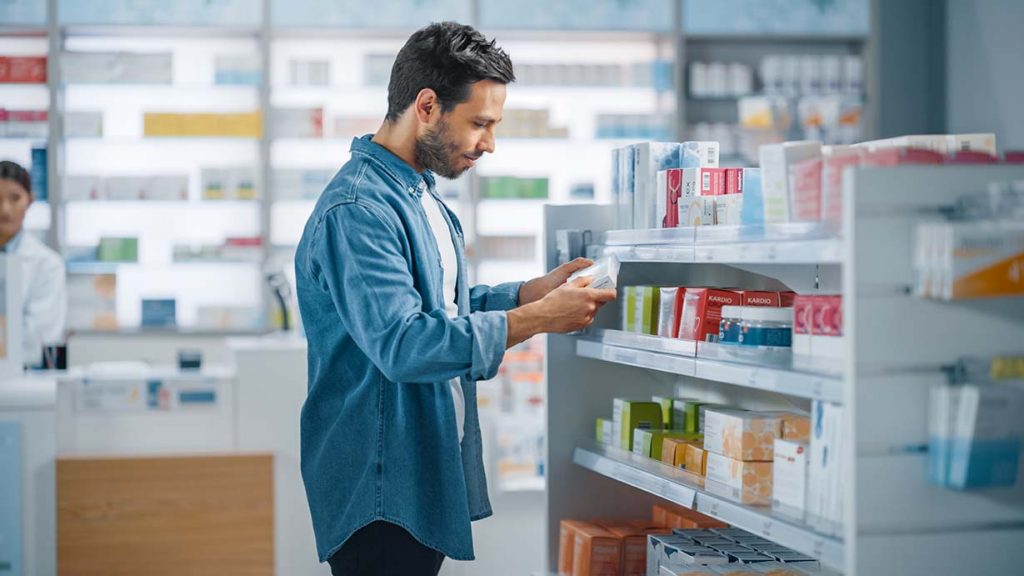
Vitamin Shoppe Goes Deep
In January 2020, just as COVID-19 began to unleash its wrath upon us, Sharon M. Leite – CEO of Vitamin Shoppe – gave an interview with the National Retail Federation to talk about her plans to steer innovation in a rapidly growing category. Much of her interview touched on customer experience in-store and how she saw many opportunities to improve on that experience, continuing to provide expertise in their industry, which had long since been a building block in establishing trust with Vitamin Shoppe customers. Her mission then was aptly and simply conveyed: “We want to help you become a better you, how you define it.”
Her interview at that time was what you might’ve expected from a newly onboard CEO. Having only been with Vitamin Shoppe for approximately 18 months, Leite was, as she should be, very future forward focused. With many emerging trends in the supplement category getting legitimate recognition, like CBD, the emphasis on continuing to build and optimize upon Vitamin Shoppe’s three pillars – quality, innovation and expertise – was her mission. And during this interview, I couldn’t help but think of what a different world it was at that time, only two short years ago. But something she had said really stuck with me. And that was, how terrifically complicated (the issue of health and wellness) this all was.
At the time, how could she possibly know the truth behind that statement?
Fast-forward to January 2021. Only one year later – but it could’ve just as well been 20, given the amount of change that we saw here in the United States. And Leite found herself having to face new, even more daunting challenges of operating a business so necessary in the preventative and holistic nature of health and wellness. Now hampered by a whole new host of pandemic business disruptions, like supply chain issues and labor shortages, Leite decided she needed to see these challenges firsthand. That’s when Leite agreed to be filmed for an episode of the CBS reality series Undercover Boss.
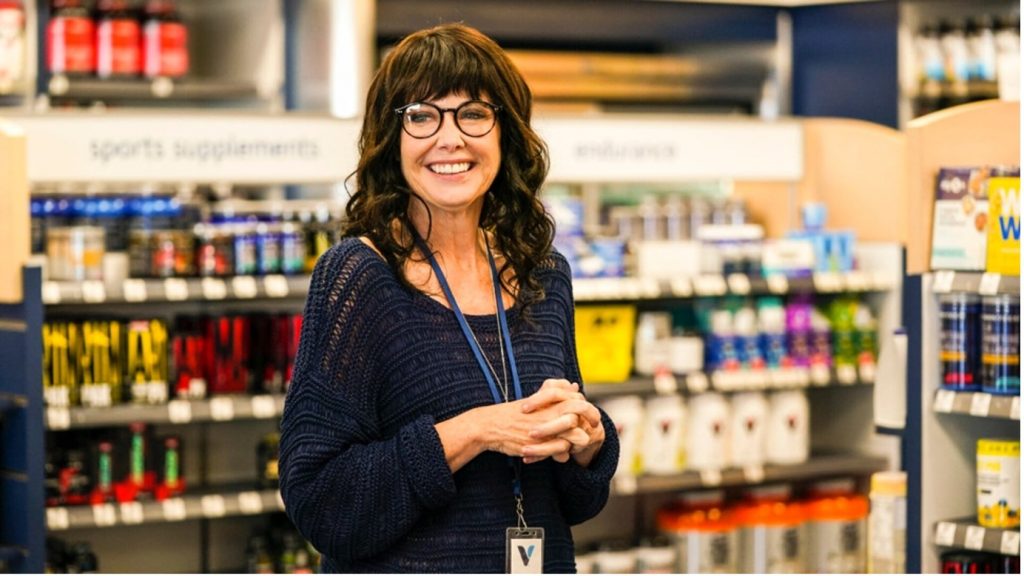
It’s a must-watch (and be sure to have your Kleenex handy – you’ll need them).
The episode was not only entertaining, it indeed was a validation of her 2020 observation. This is all very complicated.
In 2020 her emphasis was on rebooting the brand. In 2021 it was so much more than that. It was about survival. And what she came to quickly realize was that her business was and remains encased in an industry that has an awful lot of fine print. Where labels on products aren’t enough to explain product attributes, let alone adequately describe or highlight how those attributes will suit each individual shopper and their very individual and distinct needs.
Aside from the emotionally driven background stories of the three sales associates (a.k.a. Health Enthusiasts, as Vitamin Shoppe calls them) that were featured in the story line, there were many revelations that surfaced in Leite’s firsthand exploration of her business from shop level.
One of them was the solid confirmation that yes, health and wellness is a very complicated issue. Made even more complicated by what the pandemic threw at us. And highlighting the immense dependency on her Health Enthusiasts to not just be “enthusiasts” but be the key holders of knowledge and expertise for the shopper in-store.
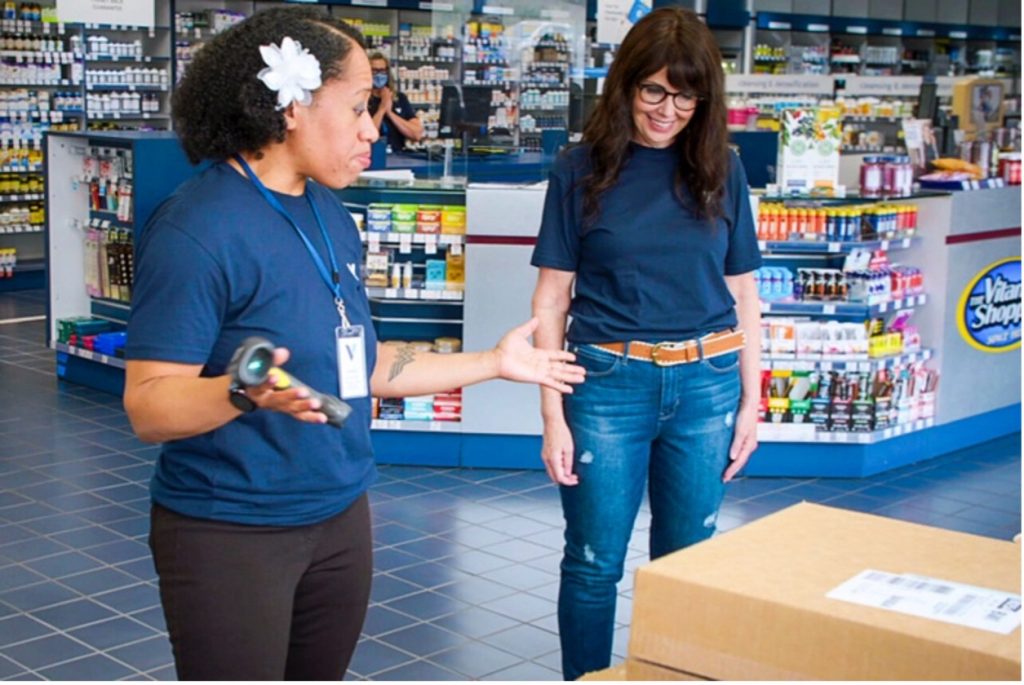
Throw in the many diverse problems that supply chain issues caused and her associates having to quickly pivot in-store – not just out-of-stock issues but then having to move the shopper quickly, if they could, to an alternate brand so the sale wasn’t lost.
Add to this the staffing shortages her stores experienced. Shortages which in some cases nearly tripled the amount of job tasks each associate had to perform on a daily basis.
The associates that were featured in the episode were nothing short of amazing. The depth of product knowledge was inspiring. I’ve been a shopper at Vitamin Shoppe for years and I’ll attest to the fact that this is not an anomaly. My experience in shopping there has always been one where I found the majority of their floor staff to be very knowledgeable on product. But I also know that their knowledge was more a reflection of their individual passion for nutritional and health-related supplements. Some are bodybuilder enthusiasts, others more homeopathic and naturalists. But regardless, they know what they’re talking about and have been great sources for me when shopping there. And one of the reasons I go back.
Any of us in specialty retailing knows, your floor staff are your greatest asset. Yes, it’s true, many consumers now do their due diligence and investigation online, prior to shopping in-store, but the moment of truth really exists in-store, doesn’t it? I mean, what happens when the product they’re looking to buy is now out of stock, what then? What if they’re shopping and come across a brand they are unfamiliar with, but might serve as an alternative? Who or what tells them it’s a good match for their needs?
And what happens when there is no “enthusiast” to steer you?
The world of health and wellness may not be new to some. But it’s possible, given our newfound respect for maintaining it, that there are a lot more consumers out there that will need help. And even more that will need to understand and come to value what they are investing in when they plunk down the money for that product. Because the price of good health is not cheap. And it’s not going to get less expensive, in fact likely the opposite.
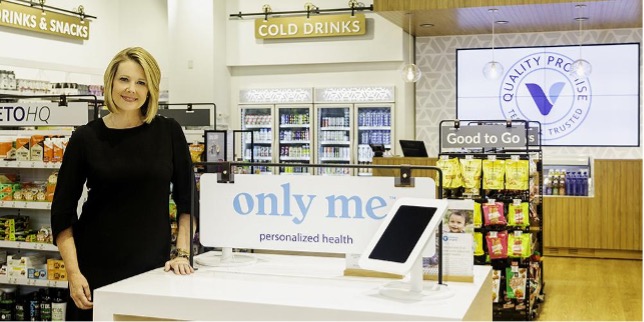
When you shell out good money towards your health, you want to know – what is this? Is it right for me? Is it going to address my needs? The consumer wants transparency. They want and need information. Especially when it comes to the health and wellness category. They don’t want fluff or flowery copy. They want facts. And, well, that’s an awful lot of copy to incorporate on a label. But when you consider that transparency builds trust with your consumer, and trust is literally currency with them, then the investment of finding ways to inform and educate them will be the glue that keeps them coming back.
Necessity Is the Mother of Invention (and it might be easier than you think)
I’ve heard various reports that COVID-19 will not be going away and that we will need to find ways to live with it (or should I say, find ways to safely navigate our way around it). I also expect that the cost of staying healthy will continue to grow. And, although the labor shortages may be something that levels off over time, the fact is, these past two years have been hard on every industry. And since payroll is for most businesses a number one controllable expense, we may not return to pre-pandemic staffing levels on the sales floor, which actually weren’t that great to begin with. Retailers overall will be looking to play catch-up, and maybe hiring up will not be an immediate go-to.
So then, what and where will that leave us?
Most definitely having to innovate on ways and workarounds to uncomplicate a complicated topic such as health and wellness and all things related.
As we’ve written many times about signage being your greatest silent salesperson, here are just a few ideas towards providing information to your in-store shopper, at the moment of truth, when it’s most needed to seal the deal. Some of them are easier than you think to implement quickly.
QR Codes
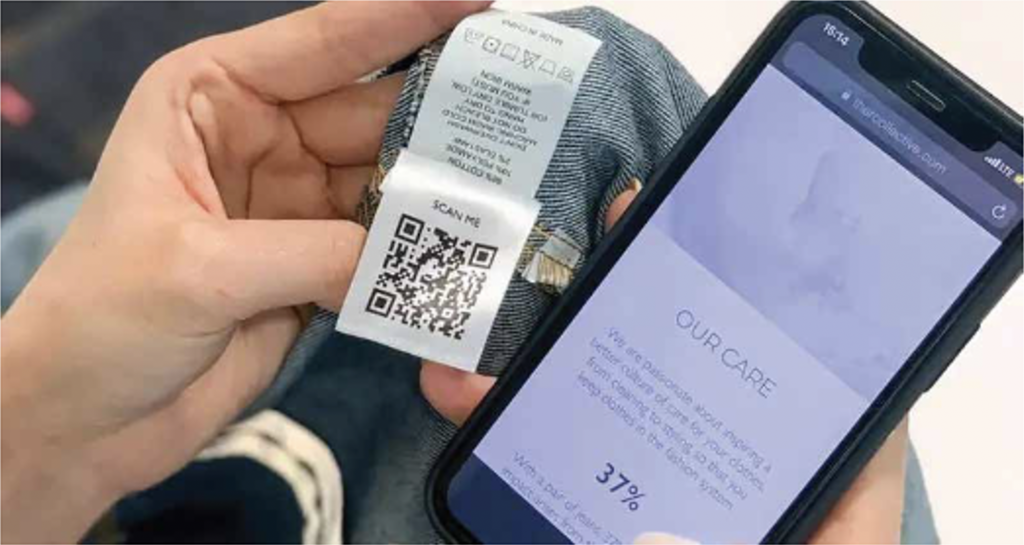
One of the easiest ways to engage your shopper is provided through a quick scan of a QR code, allowing your shopper to find the information they’re looking for, and then some.
Quick Response codes in your store signage, shelf toppers and point-of-purchase displays can take your shopper to videos, tutorials, product comparisons, customer reviews. Pretty much anywhere you can think of, allowing them to personally choose their own pathway to obtaining the information.
And Dynamic QR codes offer you the ability to change that pathway, messaging or journey for the shopper by the week, day, even the hour. All without the necessity of changing out your display or signage. The nimble and diverse use of QR codes in-store adds even more value as they can extend or change your in-store marketing campaigns with little effort (and labor) when and where you need to.
Informational Signage
When you have a shopper who needs to decipher all their options, you have to find a way to untie that knot and remove the frustration for them. And sometimes the best way to untie a knot is by laying it flat – in this case, in your signage.
Take men’s underwear.
Yeah. I know. It’s not technically in the health and wellness category (unless, that is, you’re a man who is tortured by restrictive undergarments), but indulge me for a moment.
Duluth Trading Company has perfected taking a very informative approach to selling (and uncomplicating) a very delicate topic – underwear. Which means many things, to many different men, and women. Their in-store signage is not only filled with plenty of humor, but also with boatloads of information, making it easy for their shoppers in this category to figure out what’s the remedy for them.
Here they’ve chosen to lay out the knot. And by doing so removed friction for their male shopper. Six different types of underwear. Each with their own attributes and selling points, and using a matrix-like chart that clearly defines needs, they help that shopper decide what’s best for them, with as little effort as possible.
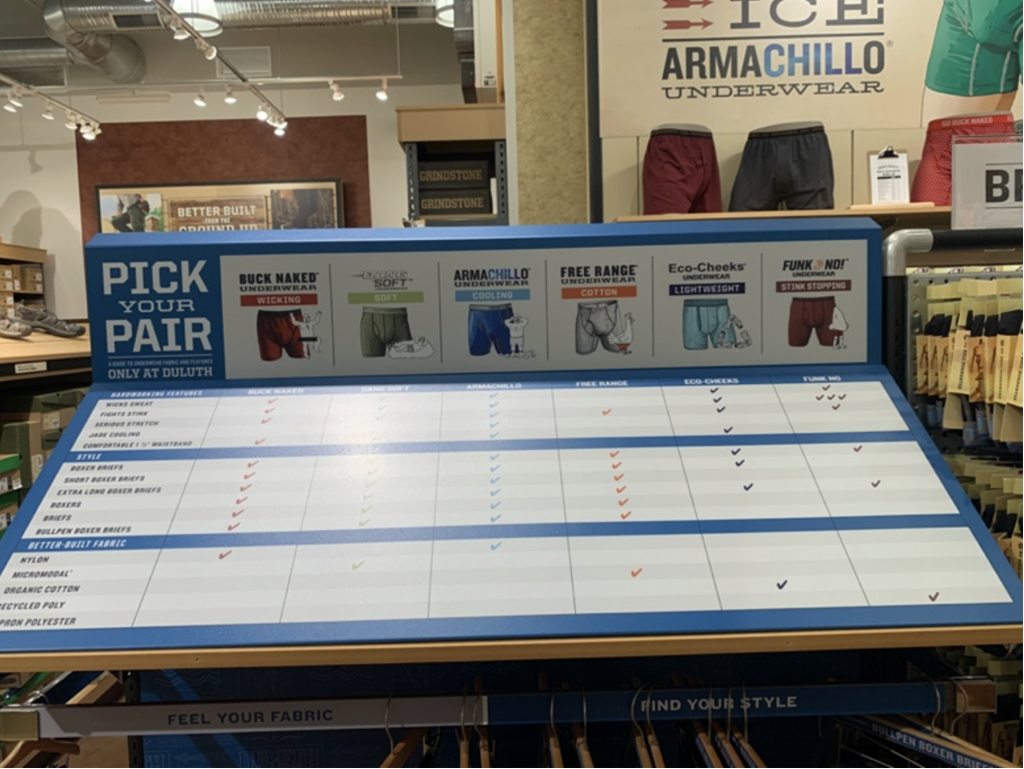
Underwear, yeah, it can be complicated. Now imagine, facing a sea of shelves of product each proclaiming to provide the best benefits.
If you watched the Vitamin Shoppe Undercover Boss video, you might recall the Health Enthusiast explaining all the ingredients in the protein powder that a customer was asking about. My goodness, how can you possibly expect your shoppers to wade through it all and come out with a purchase they’ll be happy with? That fits them and their needs? That they’ll return to you to purchase again (in-store or online)?
When you have products that have such distinct and individual offerings, with details that cannot fit on a label and an absence of staff to provide that product knowledge, informational signage like this can be your best silent salesperson.
In-store Events
Home Depot recognized a long time ago the value of DIY workshops. They knew if they helped their customer figure things out, that customer would come back to the well again and again.
If you are selling products under the health and wellness category, be it apparel, supplements or fitness equipment, why not stage an in-store event that showcases the product? Invite in fitness experts to talk about the pros and cons. Like a mini-infomercial in-store. Sponsor community fitness groups to come in and talk about their programs, their personal experience at weight loss, maybe highlighting some of the products your store sells.
Or provide demonstrations of that product in use. Because showing is so much better than telling. And when your customer can actually see that treadmill you have actually does fold down easily to fit under the bed, well, you’ve just racked up a couple of trust points, and possibly gained a sale.
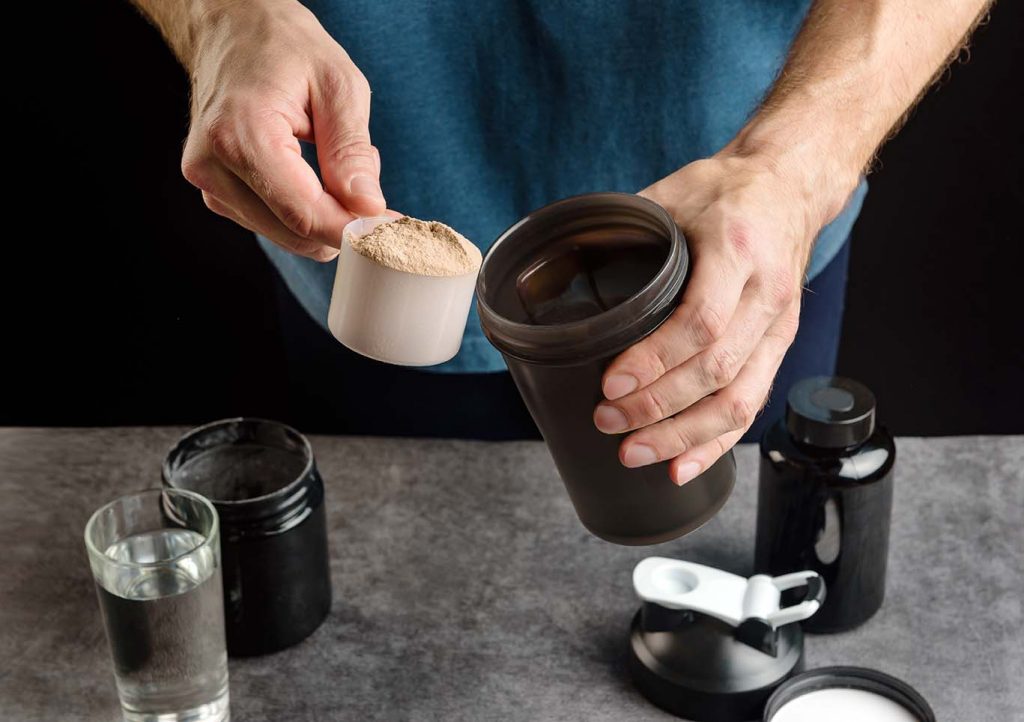
Whether it’s an equipment demonstration or a taste testing of a protein shake, having your audience engage in live presentations helps to pull them in, learn and yes, be sold. It’s brand transparency at its best and will be a reason for your customers to want to come back to you for more.
Throw a Pop-Up Party
More and more, the idea of shop-in-shops is gaining steam. Sephora in Kohl’s. Ulta in Target. Creating brand concept shops in-store has so many benefits, especially in providing a magnet positioned to provide your customers with another reason to shop you.
But why do these need to be so…permanent? And why do they need to be in-store?
Why not in your parking lot? Or in the middle of a farmer’s market?
Thinking about health and wellness – where are the watering holes of the targeted audience? Those who are interested in your products or services are dispersed across a broad array of environments like gyms, restaurants, entertainment venues (concerts), sporting events, marathons, spas, hotels, travel centers etc. etc.
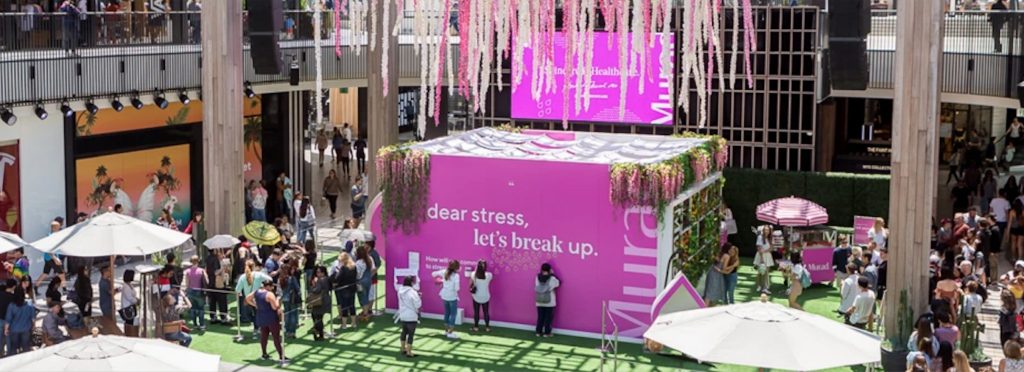
Why not set up a pop-up store that can introduce your curated health and wellness products in an experiential way? Concentrating expertise in a limited-run retail experience and reaching your audiences where they live, work and play. At the same time, it places you in the middle of a new audience who might also have like-minded missions. And the beauty is, you don’t have to make a long-term commitment but can pack up your tent and easily move to the next watering hole.
We can lend more hands and more ideas…
There are many ways to address the challenges all retailers and brands are facing right now. For over 63 years Medallion Retail has helped clients weather many storms through innovative ideas that are easy on the budget and quickly executional. We understand what turns browsers into buyers and put our expertise into play at every touchpoint in-store, taking the complex and turning it into sales-driving simplicity.
Interested in hearing more? Give our very own retail guru Chris Gordon a call at 646.677.5618
He’s got even more ideas you’ll want to hear!
[ad_2]
Source link
Related posts
Today's pick
Recent Posts
- Cultural Evolution of Hot Yoga: From Bikram’s Legacy to Modern Studio Innovations March 29, 2025
- The Future of Automotive: Innovations Shaping the Industry January 23, 2025
- The Benefits Of Online Therapy: Convenient And Effective Counseling At Your Fingertips June 1, 2024
- Seminary Schools In Texas: Nurturing Faith And Knowledge In The Lone Star State June 1, 2024
- A Definitive Guide To Understanding Business Personal Property Tax June 1, 2024
